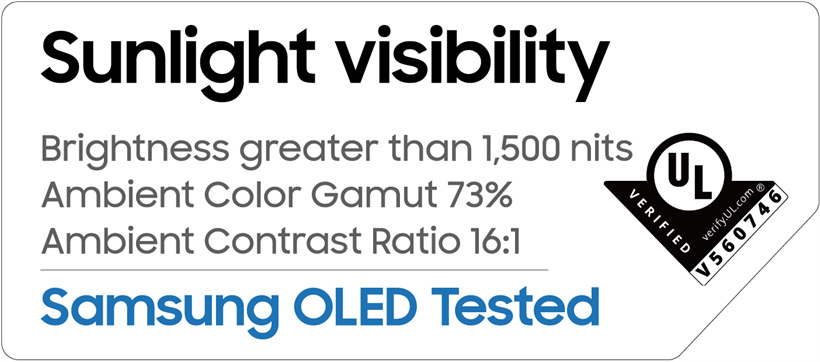□ The display is made with a new organic material to achieve a peak brightness of more than 1,500 nits
□ With much improved image quality outdoors, Samsung Display said its new OLED display will significantly enhance the world of 5G smartphones

Samsung Display Company’s Chief Executive Officer Joo Sun Choi today unveiled a striking new OLED display that delivers bright and clear outdoor visibility, befitting the spirit of the 5G era. At the same time, Samsung Display announced that this latest OLED smartphone display has been recognized by UL, the global independent safety science company, for its ‘Sunlight Visibility’ performance.
In rigorous testing, UL assessed the color gamut and luminance of the new display, both of which can greatly impact visibility outdoors. As a result, Samsung Display’s new OLED panel achieved an ‘Ambient Color Gamut’* rating of 73 percent of the DCI (Digital Cinema Initiatives)-P3 standard, and a peak brightness of more than 1,500 nits (the maximum brightness that a single display can now provide).
When taking a smartphone outdoors, the screen typically appears to darken, as texts and image colors become almost unrecognizable. This outdoor phenomenon occurs whenever one’s surroundings become even relatively bright, which makes it seem like the display’s screen brightness, color expression and color saturation are rapidly degrading, Samsung Display explained.
However, in most instances, the new Samsung OLED display is now relatively free from problems with outdoor visibility. That’s because the display depicts colors through a proprietary light-emitting process that embraces a wide color gamut, usually resulting in a high degree of chroma, or intensely vivid color. Thanks to this feature, OLED displays can now deliver vivid image quality outdoors, even where visibility is poor in general.
“In the 5G era where people spend more and more hours on their smartphones, it is crucial that we ensure a display performance that delivers bright and clear picture quality in both indoor and outdoor spaces,” said Dennis Choi, vice president and head of the Mobile Display Marketing team at Samsung Display. “Though it can be used with many types of smartphones, Samsung’s new OLED is particularly well suited for 5G devices as it will provide greater device usability and therein, more value for consumers,” he added.
This novel display, which is being made available for flagship smartphones, uses new organic material to help achieve its significantly improved outdoor visibility. The OLED material’s peak brightness of more than 1,500 nits, represents a much higher brightness than last year’s 5G flagship smartphones.
With Samsung Display’s newest OLED display now validated as having exceptional sunlight visibility, the panel is likely to be selected by several other global smartphone manufacturers, besides being used in the Galaxy S21 Ultra, to benefit consumers worldwide.
Samsung Display added that its new sunlight-friendly display’s visibility benefits will be combined with technology allowing for significant reductions in OLED power consumption that was announced late last month.
Footnotes:
*Ambient Color Gamut: Color gamut that is assessed in bright environments. Even though some display models may have the same brightness spec, those with a high color gamut recognizable by the human eye will be even more commercially viable thanks to their superior ambient brightness (luminous intensity).

